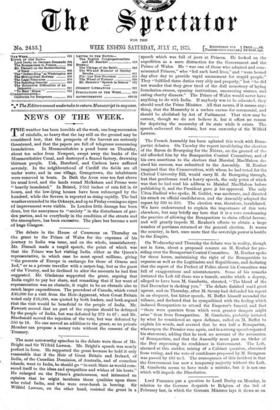The debate in the House of Commons on Thursday on
the grant to the Prince of Wales for the expenses of his journey to India was tame, and on the whole, unsatisfactory. Mr. Disraeli made a turgid speech, the point of which was that the Prince was tot visiting India, either as the Queen's representative, in which case he must spend millions, giving 'the presents of Europe in exchange for those of Ormuz and Ind," or as a private traveller with a carpet-bag, but as the guest of the Viceroy, and he declined to alter the amounts he had first suggested. Mr. Gladstone supported the grant, arguing that India ought to pay her share, and remarking that if her want of representation was an obstacle, it ought to be an obstacle also to much larger expenditures. The precedent of Canada, which voted 140,000 for a visit from the Heir-Apparent, when Great Britain voted only 2.16,000, was quoted by both leaders, and both argued that the visit would be beneficial to the people of India. Mr. Fawcett moved that no part of the expense should be defrayed by the people of India, but was defeated by 379 to 67; and Mr. Macdonald moved the rejection of the vote, but was defeated by .350 to 16. No one moved an addition to the grant, as no private Member can propose a money vote without the consent of the Treasury.


































